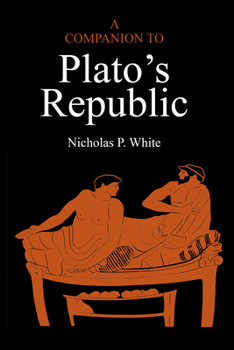A Companion to Plato's Republic
Select Format
Select Condition 
Book Overview
A step by step, passage by passage analysis of the complete Republic. White shows how the argument of the book is articulated, the important interconnections among its elements, and the coherent and... This description may be from another edition of this product.
Format:Paperback
Language:English
ISBN:0915144921
ISBN13:9780915144921
Release Date:May 1979
Publisher:Hackett Publishing Company
Length:288 Pages
Weight:0.60 lbs.
Dimensions:0.8" x 6.0" x 9.0"
Customer Reviews
2 ratings
A great guide to understand Plato's "Republic"
Published by Thriftbooks.com User , 14 years ago
I read White's book for a graduate philosophy class. I paid close attention to Plato's thesis of courage in his Republic, which I expound below. I found White's book most illuminating in explaining Plato's work. Don't read the Republic without White's help! Plato's purpose in the Republic is not to perfect the character of people as an end but only as a means to an end. Plato's aim has a definite effect on his definition of courage. I find this is especially the case when exploring his ideas on how to educate the Guardians of the city to act courageously. Plato's goal, which is explained by Nicholas P. White is to match a person's character disposition to a job they are naturally inclined to perform in the city. What White observes as part of the rationale in Plato's Republic is what White terms the "Principle of The Natural Division of Labo." (White, 17). As White posits, "Once he [Plato] has introduced the city in 369 b-d, he immediately advances the thesis, which is to dominate the rest of the Republic, that the needs of its inhabitants can best be met if each person in it performs that single task, and that single task alone, for which he is naturally suited (White, 17). With this view of human nature in mind, in Plato's model society, he divides the citizens into three classes. Rulers from whom the "philosopher king," will be selected, Guardians who are soldiers to protect the state, and the rest of the citizens classified as Artisans. This division of citizens precipitates a discussion by Plato on the four virtues that these citizens will bring to the state. In the history of philosophy this becomes known as the "four cardinal virtues"; wisdom, courage, moderation, and justice. With this introduction of courage as a virtue, Plato takes another crack at defining courage. What is also important to observe is that he introduces a new element, that of education, in his definition of courage that was absent from his early dialogue Laches. Plato espouses the idea in the Republic that the Guardians need to possess certain natural qualities; such as strength, speed, and courage. It seems odd that Plato classifies courage as a natural quality possessed by certain people. This automatically presupposes that not all people can practice the virtue of courage. Plato's successor Aristotle, will argue against this notion in his EN. In addition, Plato argues that in order for people to be courageous they must also have an aggressive thumos [passion], which makes both people and animals fearless and determined. Plato fears that the Guardians could be susceptible to using their passion of aggressiveness against there own people. Therefore, he counsels that the Guardians who naturally possess aggressiveness have to also naturally possess the opposite characteristic of gentleness as well, so that their aggressiveness will only be used against the enemy and not their own citizenry. This dialogue is significant in that it helps to
Great intepretive book on the Republic for the beginner.
Published by Thriftbooks.com User , 25 years ago
The Republic by the Plato, itself, is an excellent book. There are many books that have been written on Plato. One of the problem is that the average readers may find themselves struggle to understand many commentary and intrepetive books on Plato. Fortunately, Nicholas P. White does an excellent works by writing a very good intepretive summaries of the Republic that the average readers can understand. The author, also, gives the clear and concise idea of Platonic philosophy without demanding the readers to have fully understanding of Plato and his philosophy.




